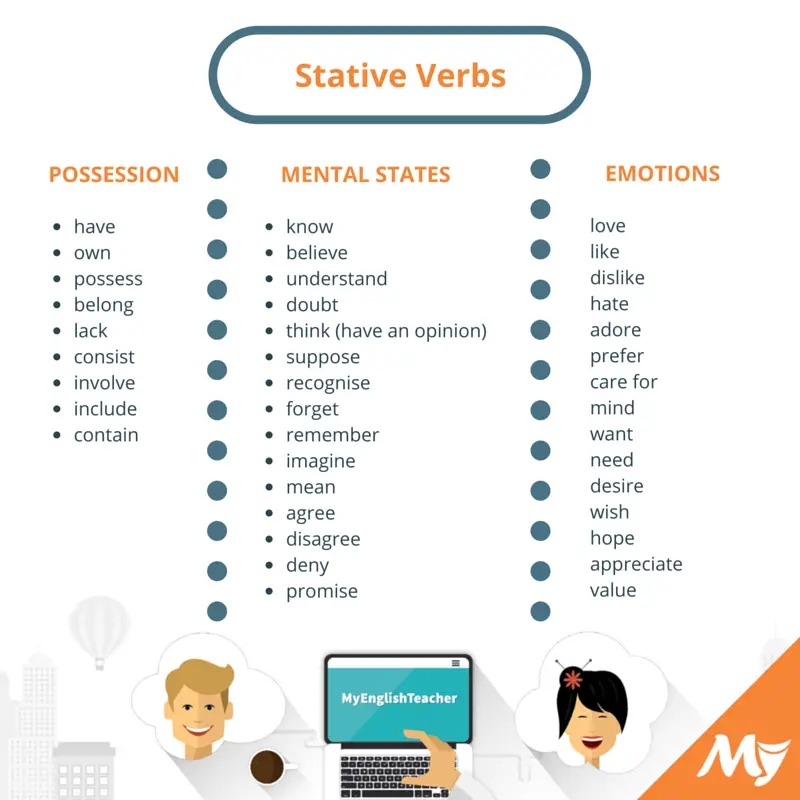
STATE or STATIVE VERBS are non-progressive verbs which means they are never or hardly ever used in progressive tenses (Present Continuous, Past Continuous, Present Perfect Continuous etc.). To put it simply, don’t use these verbs with -ing ending.
To learn state verbs, it might help if you look at the following categories:
BE
- be
- exist
- I’m being married. (incorrect)
- I’m married. (correct)
Read more:
Stative Verbs in the Progressive Form
POSSESSION
- have
- own
- possess
- belong
- lack
- consist
- involve
- include
- contain
- I’m having a car. (incorrect)
- I have a car. (correct)
- Who is it belonging to? (incorrect)
- Who does it belong to? (correct)
Read more:
What are possessive nouns, and how do we use possessive’s
APPEARANCE, DESCRIPTIONS
- seem
- look (=seem)
- sound
- appear
- suit
- fit
- He is seeming upset. (incorrect)
- He seems upset. (correct)
- It is sounding nice. (incorrect)
- It sounds nice. (correct)
Read more:
Spa Fitness Gym Workout Massage Vocabulary and Dialogs
MENTAL STATES, IDEAS
- know
- believe
- understand
- doubt
- think (have an opinion)
- suppose
- recognise
- forget
- remember
- imagine
- mean
- agree
- disagree
- deny
- promise
- I’m not knowing him. (incorrect)
- I know him. (correct)
- Are you understanding me? (incorrect)
- Do you understand me? (correct)
- I wasn’t believing her. (incorrect)
- I didn’t believe her. (correct)
Read more:
idea, concept, conception, thought
EMOTIONS, ATTITUDES
- love
- like
- dislike
- hate
- adore
- prefer
- care for
- mind
- want
- need
- desire
- wish
- hope
- appreciate
- value
- My boss is wanting me to go to the meeting. (incorrect)
- My boss wants me to go to the meeting. (correct)
- Are you minding if I smoke? (incorrect)
- Do you mind if I smoke? (correct)
- Why are you disliking him? (incorrect)
- Why do you dislike him? (correct)
Read more:
280 Basic English Words You Should Know
SENSES
- see
- hear
- feel
- taste
- smell
- Are you hearing me? (incorrect)
- Can you hear me? (correct)
- This soup is tasting delicious. (incorrect)
- This soup tastes delicious. (correct)
Read more:
English Grammar: Sentence Structure in English
PHYSICAL SENSATIONS
- hurt
- ache
- itch
- My back is hurting. (incorrect)
- My back hurts. (correct)
- My left eye is itching. (incorrect)
- My left eye itches. (correct)
Read more:
Order of Adjectives: Explanation + Exercises
MEASUREMENT
- measure
- weigh
- cost
- My dog is weighing 50 kilos. (incorrect)
- My dog weighs 50 kilos. (correct)
- How much is it costing?. (incorrect)
- How much does it cost? (correct)
Read more:
AT THE DOCTOR Dialogues and Vocabulary List
Note: Some of the above verbs have both progressive and non-progressive uses. For example:
- This soup tastes nice. (non-progressive: the soup has its taste)
- My husband has been tasting wines for an hour. (progressive: he has been actively doing this)
- This rose smells nice. (non-progressive: the rose has its smell)
- Sue is smelling the rose. (progressive: she’s actively doing it)
- I can see somebody in the window. (non-progressive, state verb)
- I’m seeing a guy from the office. (progressive: see=meet)
- I have a car. (non-progressive, state verb)
- I’m having breakfast. (progressive: having=eating)
- I weigh 60 kilos. (non-progressive, state verb)
- I was weighing myself when the scales broke. (progressive: I was actively doing it)
- I think Brad Pitt is handsome. (non-progressive: opinion)
- I’ve been thinking about Brad Pitt all day. (progressive: I’ve been actively doing this)

























“love” should be excluded from the list of stative verbs as, for example, in the sentence “i’m loving it” it means “to enjoy”